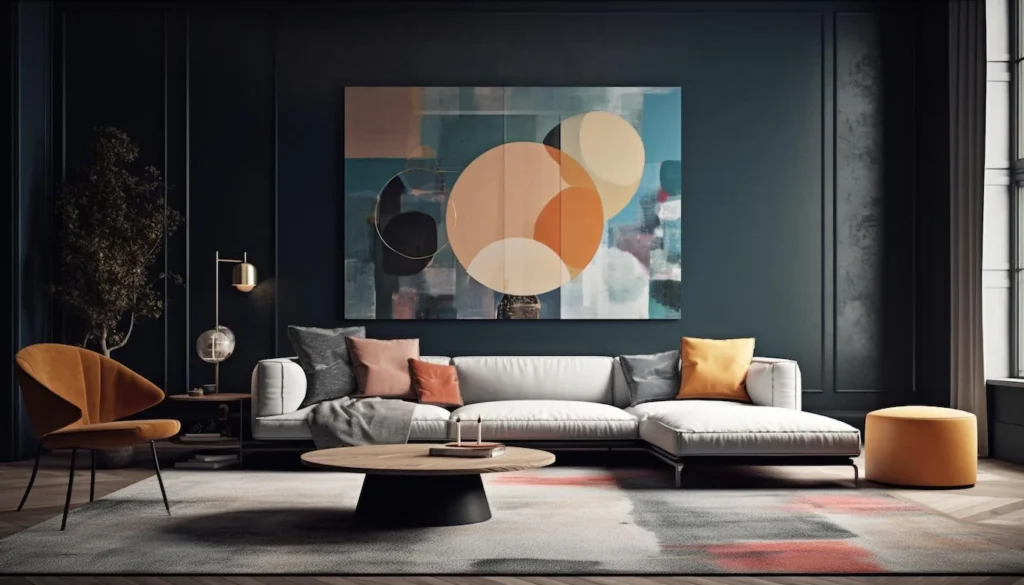Communication in Health and Social Care. Great Course. Very Easy to Understand
BA (Hons) Interior Design

Overview:
USW’s BA (Hons) Interior Design course resides within the Faculty of Business and Creative Industries and is based in the creative centre of Cardiff. This degree will ignite your passion for the subject and prepare you for a career in design. Our professional network continuously expands, reflecting our relationship with various industry partners who invest in a course that nurtures designers of the future.
We actively engage with the architecture and design industry across all aspects of the course, and their input informs our teaching. This creates a fulfilling student experience and produces a highly employable graduate, equipped with the essential discipline-specific skills, as well as the broader transferable skills necessary for industry.
Ethical, social and environmental responsibility are at the heart of this course, with many projects based on the adaptive re-use of existing buildings and spaces with a clear agenda for conservation. Sustainability, well-being and user experience are also focal points on the course.
Your interest in art and design, as well as your creative and strategic thinking, will be combined with the fundamental teaching of Interior Design-specific knowledge to create innovative and considerate outcomes. Covering a comprehensive range of skills, such as research, evaluation, analytical and orthographic drawing, model making and digital software processes, you will develop confidence in your own individual response and creation. These projects will often be live briefs, in collaboration with industry, the community or with other USW courses.
BA (Hons) Interior Design
Typical A-Level Offer
CCC to include a relevant art and design subject (this is equivalent to 96 UCAS tariff points).
Typical Welsh BACC Offer
Pass the Advanced Welsh Baccalaureate Diploma with Grade C in the Skills Challenge Certificate and CC at A Level with a relevant art and design subject (this is equivalent to 96 UCAS tariff points).
Typical BTEC Offer
BTEC Extended Diploma Merit Merit Merit in a relevant subject (this is equivalent to 96 UCAS tariff points).
Typical Access to HE Offer
Pass Access to HE Diploma with a minimum of 96 UCAS Tariff points
Online application form
Information requested on this form should be completed in as much detail in order to process your application successfully. All fields marked * must be completed.
Apply Now
Entry Requirements
Contextual offers
We may make you a lower offer based on a range of factors, including your background (where you live and the school or college that you attended for example), your experiences and individual circumstances (as a care leaver, for example). This is referred to as a contextual offer and we receive data from UCAS to support us in making these decisions. USW prides itself on its student experience and we support our students to achieve their goals and become a successful graduate. This approach helps us to support students who have the potential to succeed and who may have faced barriers that make it more difficult to access university. Here is a link to our Contextual Admissions Policy.
Other qualifications and experience
We can also consider combinations of qualifications and other qualifications not listed here may also be acceptable. We can sometimes consider credits achieved at other universities and your work/life experience through an assessment of prior learning. This may be for year one entry, or advanced entry to year two or three of a course where this is possible.
To find out which qualifications have tariff points, please refer to the UCAS tariff calculator.
If you need more help or information or would like to speak to our friendly admissions team, please contact us here
Applicants in the UK
Selection for this course is based on a suitable application. If you do not meet the entry criteria, you may also be required to provide a portfolio of your work to help us assess your suitability for the course.
Applicants outside the UK
Selection for this course is based on a suitable application and submission of a portfolio of your work which the Course Leader confirms is suitable for an offer to be made.
WHAT YOU WILL STUDY
Our Interior Design modules are designed holistically to help you to become a confident, creative, independent, socially and ecologically minded Designer, equipped with the practical and intellectual skills needed to flourish in industry.
Throughout the course, you will take part in live projects and industry-guided briefs, giving you the practical experience of working with and presenting to a client. Live briefs typically involve understanding and re-designing existing buildings following a set of specific criteria – much like you will do as an Interior Designer.
Interior Design involves a combination of creativity and pragmatism. You will learn to analyse the social, historical and environmental context of an existing building and respond to the specifics of the design brief, structure, location and user group logically, sensitively and creatively.
Our modules help you to develop your communication skills, so that you can express your ideas effectively in a variety of formats. You will learn the core skills of 2D and 3D visual communication, including orthographic drawing, model making, and using computer programmes such as AutoCAD, 3DSmax, Revit, Illustrator, InDesign, Photoshop, and Sketch Up.
You will learn how to produce work aligned with industry standards but will also be encouraged to approach design projects in a spirit of experimentation to develop your own identity as a designer.
Ultimately, our modules equip you with the skills needed to be an Interior Designer and to approach design projects with confidence, creativity and professionalism.
Year One
Year One lays the groundwork for the degree, providing you with the core drawing, design, building analysis and research skills – all essential skills for an Interior Designer.
- Interior Design Projects 1 (20 credits)
This module introduces students to the key concepts and approaches underpinning Interior Design practice, enabling students to produce their own creative work with a defined rationale. On this module, students ‘learn by doing’ while fulfilling Interior Design project briefs that develop understanding of 3D geometry and spatial configuration. - Interior Architectural Communication 1 (20 credits)
This module runs in tandem with the Interior Design Projects 1 module and allows students to explore how they visually communicate their ideas at various points in the design process, as well as equipping them with the analogue and digital modelling and visualization skills to do so. - Building Analysis (20 credits)
This module will address ways in which interior environments can impact upon users. It will cover issues such as: space and structure; functions and principles of building interiors; organisation and hierarchy; materials used in interior spaces; adaptive re-use of buildings; building in relation to an environmental setting; accessibility; ergonomic and anthropometric data. - Interior Design Core Skills (20 credits)
The module begins with an introduction to basic drawing conventions, awareness of scale, representing a 3D space as a 2D drawing, understanding how to cut plans and sections and represent elevations, as well as 3D projections and perspective views. These processes are initially taught hand drawn before introducing basic CAD software to digitize these drawings. - Interior Design in Context 1 (20 credits)
This module lays the foundation for understanding how to analyse, research and discuss designed objects and ideas surrounding their design, production or consumption. Through the study of precedent projects, students begin to understand how design is influenced by the context(s) of a specific time and place, as well as to appreciate that their own design work relates to the context(s) in which they operate. - Ethical and Sustainable Design (20 credits)
Students will explore ways in which designers respond to environmental, social and ethical issues in society through creative practice. This will enable students to reflect upon their own practice and to consider the practical effects and symbolic implications of their design work.
Year Two
Year Two extends the practical and intellectual skills that you developed in the first year and pushes you toward greater independence in your work. Year Two becomes more industry-focused, giving you greater insight into professional standards and industry expectations. If you choose to do the one-year sandwich placement or go on a short-term work experience or summer placement, you will be supported to develop a portfolio and CV.
- Interior Design Projects 2 (40 credits)
This module emphasizes creative and strategic thinking in response to a brief and the increasingly independent exploration of design concepts and visual presentation methods. Students are introduced to a range of specialist areas within Interior Design (such exhibition, retail, hospitality, commercial, heritage or cultural projects) to recognize how to approach different types of projects, as well as to increase awareness of the field and career possibilities. - Interior Architectural Communication 2 (20 credits)
On this module, students will learn about analogue and digital presentation techniques and will develop skills to present information in 2D and 3D physical and digital formats. Students will explore visual branding strategies and will learn to create visuals that capture the essence of a project’s visual identity. Students will also learn to do a feasibility study, which will prepare them for self-choice projects in final year. - Interior Design Professional Skills (20 credits)
This module addresses two areas of professionalism relative to Interior Design: firstly, industry standard production drawing and specification; secondly, recognition of one’s current skill level in relation to desired career goals. - Interior Design in Context 2 (20 credits)
This module builds on students’ research, analysis and communication skills, enabling students to understand and explain in greater depth the contexts and concepts relating to Interior Design. Students will work independently and collaboratively to develop communication and project management skills. - Conservation Principles and Sustainability (20 credits)
This module addresses the key conservation principles that designers should adhere to when dealing with buildings of historical or social significance, especially listed and protected buildings. This module also addresses sustainability in relation to the conservation of the existing built environment, as well as regarding sustainable technologies in material specification.
Optional Sandwich Year Placement
- Employment Experience Diploma (Interior Design) (120 credits)
On this module, students will undertake a period of supervised work experience, in order to gain industry experience and to develop professionalism. In doing so, students will learn to work with the wider design team, other industry professionals and/or clients.
Year Three
Year Three enables you to become an autonomous Designer, aware of your own goals, as well as the impact that you can have as a Designer. Importantly, Year Three prepares you for industry. Through our extensive alumni network and industry contacts, we focus on the transition from university to the workplace. Your Final Major Project is your opportunity to work on a project focused on your interests as a Designer, supported by USW Interior Design academics and industry mentors. For these reasons, many students secure employment in the industry soon after graduation.
- Interior Design Major Project (40 credits)
This module may be seen as the ‘capstone’ of the degree, where students draw on the skills that they have developed throughout the course to produce a self-selected major project. - Production Information (20 credits)
On this module, which runs in tandem with Interior Design Major Project, students will learn to produce the necessary technical drawings following industry standards to explain and quantify the proposed Interior Design scheme and main internal elements for their self-selected major project (e.g. technical detailing, finishes layouts and reflected soffit plans integrating lighting schematics). - Competition and Exhibition (20 credits)
This module will encourage students to focus on design work that is more outward facing, including entering design competition briefs and planning the end of year Degree Show, in order to build up their professional profiles and portfolios. - Critical Research in Interior Design (20 credits)
This module gives students the opportunity to explore an area of personal interest and/or in relation to their career goals. Students will research a topic of their choice and develop a reasoned argument, culminating in a final written outcome of approximately 5,000 words, which may include elements of originality. - Professional Practice (20 credits)
On this module, students will engage with wider issues relating to the Interior Design industry, including professional requirements and ethical standards. This serves to develop ethical professionalism, as well as time and project management skills.
Subject to revalidation
This course is subject to revalidation, this means it is under review as part of the University’s standard quality assurance and enhancement processes. Course and module content is indicative and may change through the revalidation process. As soon as the course is revalidated, the details will be confirmed and published on the University website. In the unlikely event the course does not go ahead as planned, or is significantly amended, we will write to inform you. If this happens, we’ll help you to find a suitable alternative course either at USW or at another provider.
Teaching
Our teaching team is comprised of full and part time staff who also work within industry. This ensures that your teaching is highly relevant and responsive to the needs of industry.
Most teaching takes place in the Interior Design studio at USW’s creative campus in Cardiff and typically involves a mix of lectures, seminars, tutorials, practical classes and workshops. Some lectures and tutorials may take place online, and some practical classes may take place in specialist computer labs or in the fabrication workshops on campus. Some teaching may also take place off-campus, such as on a study trip or site visit.
Assessment
We use a variety of assessment types on the Interior Design course to assess a range of skills and to cater for different learning preferences. There are no exams on this course. The majority of assignments are practical and design-based.
We do our best to spread the submission deadlines throughout the term to avoid ‘deadline bunching’, and we offer regular formative feedback (in various formats) to help you develop your work.
COURSE DETAILS
Accreditations
USW Interior Design is SBID(Opens in a new tab) recognised.
Placements
The USW Interior Design course prioritises employability, so we have built into the course many opportunities for students to develop their portfolios, make industry contacts and gain invaluable skills and experience – all to help students prepare for and secure work experience and employment.
We work closely with the Careers Service(Opens in a new tab), who help our students to develop CVs and online profiles, as well as showcase and present their portfolios to prospective employers. We also work with the Student Enterprise team, who advise students on how to freelance or start their own businesses.
Our strong network of industry links and alumni regularly support the course through events, workshops, mentoring, as well as offering live competition briefs that often result in work experience and placements.
The USW Interior Design course offers an accredited one-year sandwich placement (the Employment Experience Diploma module, 120 credits). The USW Placements team advises on how to find a suitable work placement, as well as providing support during the placement year.
Most of the placements are in Cardiff and the South West region, with some students finding opportunities further afield, such as London and Europe. Many of these placements lead to employment and, in turn, further placements in those practices where we have alumni.
Field Trips
The Interior Design course often goes on study trips, whether locally or further afield.
This may include visits to meet industry partners, to do off-campus drawing activities or creative workshops, to see buildings of significance or cultural venues such as museums and galleries, or to conduct site visits in relation to live project work.
There are many sites of creative and cultural interest in the UK that we have visited, including locally in South Wales, the South West, London and Northern England.
We have also taken international study trips to places such as Venice, Milan, Barcelona, Berlin, Tokyo and Chicago, sometimes alongside other courses in the faculty.
Some study visits relate directly to the course curriculum, while others give opportunity to broaden your creative horizons through the experience of culture-based travel, whether near or far.

Additional Costs
We also welcome international applications with equivalent qualifications. Please visit the country specific pages on our international website for exact details.
However, if you have previously studied through the medium of English IELTS might not be required, but please visit the country specific page on our international website for exact details. If your country is not featured please contact us.
English Requirements
In general, international applicants will need to have achieved an overall IELTS grade of 6.0 with a minimum score of 5.5 in each component.
CAREERS
The Interior Design course teaches discipline-specific content that has a clear focus on preparing you for a career in Interior Design. These skills are also applicable to any specialism that relates to the built environment, spatial/3D design, as well as applied design and detail.
Successful graduates of the course are employed as Interior Designers in design and architectural firms. There are graduates who have also used their skills and gone on to work in installation, event and retail design. Some work in 3D visualisation or as software technicians. Some have also developed careers in construction and project management, while others have gone into education at school and university level. A number of graduates have also chosen to set up their own design companies.
By the time you graduate, you will have a substantial and varied portfolio covering many aspects of Interior Design, including:
- Interior products
- Physical identity and visual branding
- Conservation
- Accommodation
- Workplace
- Exhibition design
- A self-choice project
- External competition briefs
You will develop as a creative, conceptual Designer whilst establishing essential discipline-specific processes for project design and implementation. This is supported by the fundamental skills of research, analysis and strategic thinking. Most importantly, you will establish a considerate, user-focused approach to design whilst building on the principles of ethical and sustainable design thinking.
Our links with industry allow the teaching content to be relevant whilst also offering a variety of experiences from live briefs, mentoring and placements. The USW alumni from the Interior Design course go on to work in renowned local and national companies.
Fees
Full time
- 12 to 18 months
£7,250
You’ll study 9 modules in total (approx. 37 hrs/week).
Part time option one
- 12 to 18 months
£4,250
You’ll study 6 modules per year (approx. 25 hrs/week).
Part time option two
- 12 to 18 months
£5,500
Have a question about our professional qualifications?

Contact us about our professional qualifications
If you have any questions about our professional qualifications in finance and banking, please contact our customer services team.
Call us
- +44 (0) 203 771 5653
- admissions@westfieldcollege.co.uk
What Our Students Have To Say
Hi, I recently started Access to Higher Education Diploma (Nursing and Midwifery) course with Westfield College.
--Komal Kiran Galaria
DesignerMy experience with Westfield College is great. The supervisor and the admin team are proactive and efficient.

